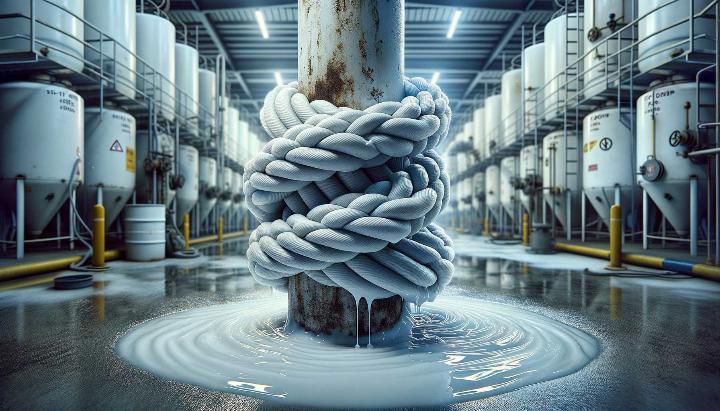Have you ever wondered why choosing the right rope can make or break your project? Whether you're a seasoned sailor, an industrial professional, or a DIY enthusiast, understanding the top uses of polyester and manila rope is crucial for success. In this comprehensive guide, we'll unravel the mysteries behind these versatile materials and explore their unique applications across various industries.
Did you know that polyester rope boasts high UV resistance and a remarkable ability to withstand rot, mold, and even chemical damage? Or that manila rope's natural charm and biodegradability make it a favourite for both practical and decorative uses? From the high seas to your backyard, these ropes play pivotal roles in our daily lives, often without us even realising it.
Join us as we dive into the fascinating world of polyethylene fiber uses, polyester rope uses, and manila rope uses. We'll explore how these materials have revolutionised industries, from marine applications to home decor, and why understanding their unique properties is essential for making informed decisions. Whether you're looking to upgrade your boat's rigging, secure heavy machinery, or add a rustic touch to your home, this guide will equip you with the knowledge to choose the perfect rope for your needs.
Polyester Rope Uses and Applications
When it comes to reliable and versatile ropes, polyester is a standout choice that has revolutionised various industries. As an avid rope enthusiast, I've seen firsthand how polyester ropes have become the go-to option for many demanding applications. Let's dive into the fascinating world of polyester rope uses and discover why they've become so popular.
Popular Marine Uses for Polyester Rope
If you've ever spent time around boats or marinas, you've likely encountered polyester ropes in action. Their exceptional properties make them ideal for marine environments:
- Superior UV resistance: Polyester ropes maintain their strength even under constant exposure to harsh sunlight, making them perfect for long-term outdoor use.
- Excellent rot and mold resistance: Unlike natural fibers, polyester doesn't deteriorate when exposed to water, ensuring longevity in wet conditions.
- Low stretch and high strength: These characteristics make polyester ropes ideal for mooring lines and anchor rodes, providing stability and security for vessels of all sizes.
I remember chatting with a seasoned sailor who swore by polyester ropes for his yacht's rigging. He explained how the rope's low stretch properties allowed for precise sail control, even in challenging weather conditions.
Industrial Applications of Polyester Rope
The versatility of polyester rope extends well beyond the marine world. In industrial settings, these ropes truly shine:
- Heavy-duty hauling and lifting: Thanks to their high strength-to-weight ratio, polyester ropes are excellent for construction and manufacturing applications.
- Tie-downs and securing loads: The low creep of polyester ropes ensures that cargo remains tightly secured during transportation.
- Chemical resistance: In environments where exposure to acids or other chemicals is a concern, polyester ropes offer superior protection compared to many alternatives.

Outdoor and Recreational Uses for Polyester Rope
Beyond marine and industrial applications, polyester ropes have found their way into various outdoor and recreational activities:
- Camping and hiking: Lightweight yet strong, polyester ropes are perfect for setting up shelters or creating makeshift clotheslines.
- Outdoor sports: From rock climbing to zip-lining, polyester ropes provide the necessary strength and durability for adventurous pursuits.
- Gardening and landscaping: The weather-resistant properties of polyester make it an excellent choice for trellises, plant supports, and other outdoor projects.
Have you ever considered how versatile polyester ropes can be in your day-to-day life? From securing a tarp over your backyard BBQ to creating a sturdy clothesline, the possibilities are endless.
In conclusion, polyester ropes have earned their reputation as a versatile and reliable choice across various industries and applications. Their unique combination of strength, durability, and resistance to environmental factors makes them an excellent option for both professional and personal use. Next time you're in need of a dependable rope, consider giving polyester a try – you might be surprised by its performance!
Why Choose 10mm Polyester Rope for Your Needs provides a deeper understanding of the benefits of polyester ropes and their varied applications across different environments.
Polyethylene Fiber Uses and Applications
As a materials enthusiast, I've always been fascinated by the versatility of polyethylene fibers. These remarkable synthetic strands have revolutionised numerous industries, offering a unique combination of strength, durability, and flexibility. Let's explore the wide-ranging applications of polyethylene fibers and discover why they've become a go-to material for manufacturers worldwide.
Industrial Applications of Polyethylene Fibers
In the industrial sector, polyethylene fibers have found their niche in various applications, thanks to their exceptional properties:
- Marine components: Polyethylene's resistance to water and chemicals makes it ideal for ropes, nets, and protective gear in marine environments.
- Piping systems: The durability and chemical resistance of these fibers make them perfect for reinforcing pipes in harsh conditions.
- Liquid dispensing: Polyethylene's inert nature ensures safe and efficient liquid handling in various industries.
I once visited a manufacturing plant where polyethylene fibers were being used to create high-strength ropes for offshore oil rigs. The plant manager explained how these ropes outperformed traditional materials in terms of durability and resistance to harsh marine conditions. It was eye-opening to see firsthand how a simple fiber could play such a crucial role in industrial safety.

Consumer Products Made with Polyethylene Fibers
Beyond industrial uses, polyethylene fibers have made their way into our everyday lives through various consumer products:
- Sports apparel: The moisture-wicking properties of polyethylene make it an excellent choice for athletic wear, keeping you dry and comfortable during workouts.
- Outdoor furniture: Polyethylene fibers are used to create durable, weather-resistant fabrics for patio furniture and shade structures.
- Geotextiles: These fibers play a crucial role in landscaping and civil engineering projects, providing soil stabilisation and erosion control.
Have you ever wondered why your favourite hiking socks keep your feet dry even on long treks? Chances are, they're made with polyethylene fibers. The next time you're out shopping for outdoor gear, take a closer look at the material composition – you might be surprised by how often polyethylene appears!
In conclusion, polyethylene fibers have proven to be a game-changer in both industrial and consumer applications. Their unique combination of strength, flexibility, and resistance to various environmental factors makes them an invaluable material across multiple sectors. As technology advances, we can expect to see even more innovative uses for these versatile fibers in the future. To explore further comparisons, check out Comparing Steel Ropes vs UHMWPE from Leading Rope Manufacturers.
Manila Rope Uses: Versatile Applications for a Natural Fiber
As a rope enthusiast, I've always been fascinated by the timeless appeal of manila rope. This natural fiber, derived from the abaca plant, has been a staple in various industries for centuries. Known for its exceptional strength, durability, and resistance to saltwater, manila rope continues to be a popular choice in many applications. Let's explore the diverse world of manila rope uses and discover why it remains a preferred option for many professionals and DIY enthusiasts alike.
Marine and Outdoor Uses of Manila Rope
When it comes to maritime applications, manila rope has long been a trusted companion for sailors and boating enthusiasts. Its natural resistance to saltwater makes it an excellent choice for various marine uses:
- Ship lines and mooring: Manila rope's strength and durability make it ideal for securing vessels to docks or other boats.
- Anchor ropes: The rope's ability to withstand the harsh marine environment ensures reliable anchoring in various conditions.
- Climbing nets: Many outdoor adventure parks and playgrounds use manila rope for its sturdy and grippy texture, perfect for creating challenging climbing structures.
I recall a memorable sailing trip where our captain swore by manila rope for certain applications, praising its natural feel and reliable performance in wet conditions. It's a testament to the enduring quality of this traditional material in modern maritime settings.

In landscaping and gardening, manila rope finds its place as both a functional and aesthetic element:
- Plant supports: The natural look of manila rope blends seamlessly with garden aesthetics while providing sturdy support for climbing plants.
- Rustic fencing: Create charming garden borders or barriers using manila rope strung between wooden posts.
- Hammocks and swings: The rope's strength and comfort make it perfect for outdoor relaxation furniture.
Industrial and Decorative Applications for Manila Rope
Beyond the nautical and outdoor realms, manila rope has found its way into various industrial and creative applications:
- Construction and utility work: The rope's strength makes it useful for hauling materials or creating temporary barriers on construction sites.
- Exercise equipment: Fitness enthusiasts appreciate manila rope for battle rope exercises, valuing its weight and tactile feedback.
- Home decor: From rustic chandeliers to stair railings, manila rope adds a touch of natural charm to interior design projects.
Have you ever considered incorporating manila rope into your home decor? Its versatility might surprise you - I've seen stunning wall hangings and even furniture accents crafted from this humble material.
While manila rope boasts many advantages, it's essential to consider its limitations. Unlike synthetic ropes, manila can be susceptible to rot and mildew if not properly maintained. It also tends to shrink when wet, which can affect its performance in certain applications. However, for many users, these drawbacks are outweighed by the rope's natural feel, biodegradability, and classic aesthetic.
In conclusion, manila rope continues to prove its worth across a wide range of applications, from the high seas to your living room. Its unique combination of strength, texture, and eco-friendliness ensures that this natural fiber rope will remain a popular choice for years to come. Whether you're a maritime professional, an outdoor enthusiast, or a creative DIYer, consider giving manila rope a try in your next project - you might just discover a new appreciation for this versatile natural fiber. To explore more about the strength of manila rope, visit Discover the Strength of 3 Strand Twisted Manila Rope.
Choosing the right rope is crucial, and understanding the distinct advantages of polyester and manila ropes can guide informed decisions. Polyester rope uses include high UV resistance, low elongation, and excellent chemical and abrasion resistance, making it ideal for marine and industrial applications. Meanwhile, manila rope uses highlight its durability and eco-friendliness, making it suitable for decorative and functional purposes alike. Both types offer unique benefits tailored to specific needs.
Discover More Through Our Inquiry Form
Fill in the inquiry form above to learn more about our custom rope solutions and find the perfect fit for your specific requirements. Our experts are here to help you make the best choice.